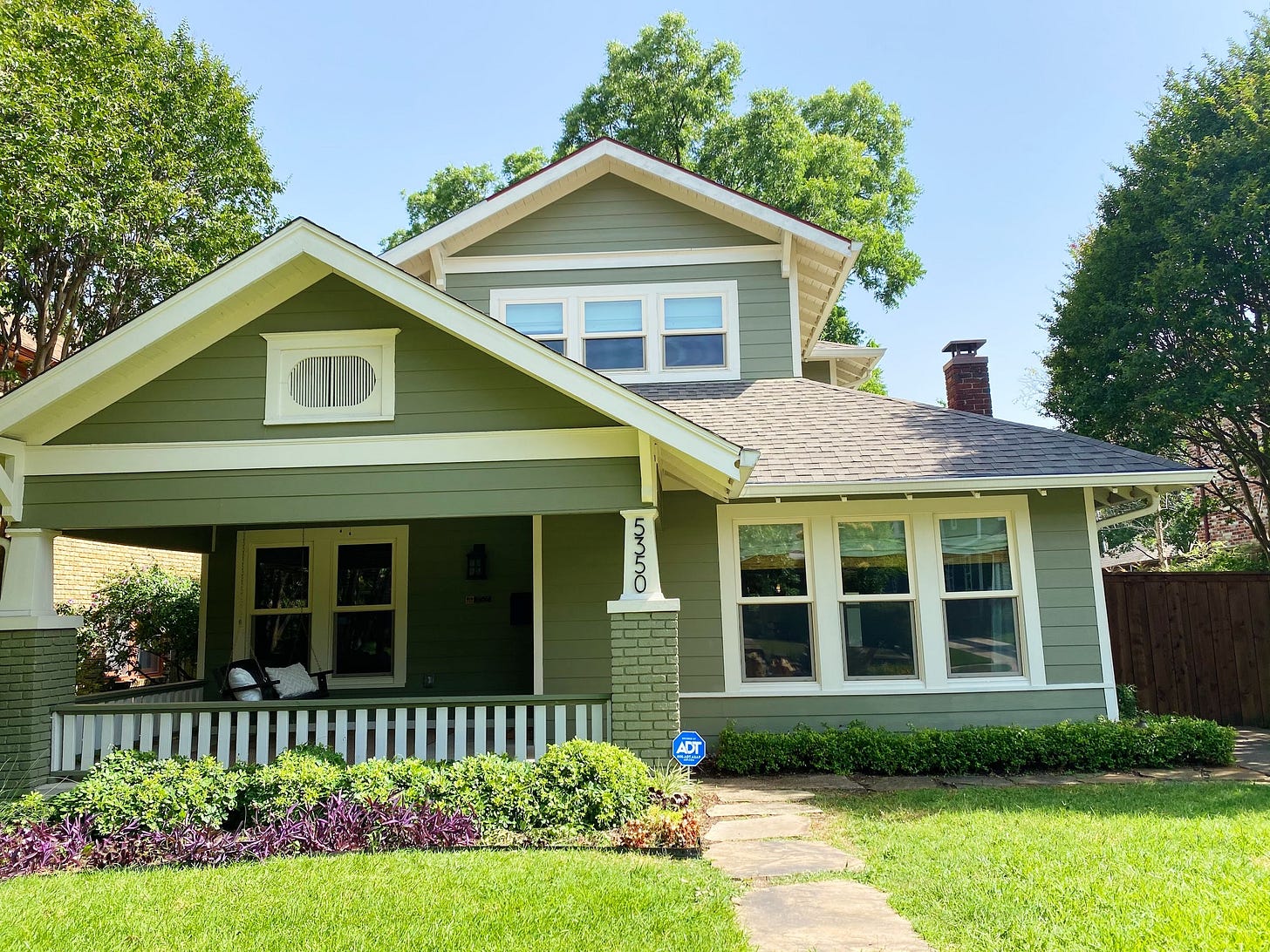Your First Time Doesn’t Have to Be Scary!
A Guide on First Time Home Ownership in Partnership with Balsa
This week on NYBIA, we’re gonna do things a little differently. While I typically love sharing my absurd life stories with you, I have never personally owned a home (and living in San Francisco certainly hasn’t helped that narrative). Therefore, writing an article on home ownership didn’t feel quite right. That’s why this week I am going to be sharing the spotlight with my friend and fellow Wake Forest alum Ruffin Mitchener.
So, how did you get into real estate? (Kelsey)
I attended Wake Forest for undergrad (go Deacs!). During school, I studied accounting and started my career as an auditor with Deloitte in NYC. Shortly after starting in audit, I realized I wanted to pivot completely to a much more entrepreneurial setting. Growing up as the daughter of two entrepreneurs in real estate, I found myself especially curious about innovation in the real estate industry. So after discovering PeerStreet, an Andreseen Horotwitz backed start-up building an investment platform for real estate debt, I eagerly accepted a full-time position on the finance team. For three exciting years, I worked with the team to grow our investment portfolio and scale the operations from a Series A to a Series C stage company. Working at PeerStreet, in a high-growth startup environment, validated my passion for entrepreneurship and gave me the confidence I needed to launch balsa -- an e-learning community for the future generation of homeowners. (Ruffin)
Can you tell us a little bit about yourself and your company, Balsa? (Kelsey)
As I mentioned, I grew up with two parents in real estate. My dad works on the commercial side developing shopping centers across the SouthEast. And my mom is the owner and founder of a residential real estate brokerage firm in Charlotte, NC. As a child at the dinner table, I truly learned more than I ever wanted to know about real estate. Back then, I have to admit, it was annoying listening to my parents constantly “talk shop”. And it wasn’t until a few years ago when I bought my first home, a one bedroom apartment in Santa Monica, that I finally realized just how fortunate I was to have access to this industry knowledge. Becoming a first-time homeowner, I was completely baffled by how confusing and scary the whole process felt. I spent years studying and mastering GAAP (the generally accepted accounting principles), yet no one thought to teach me the basics of mortgages and home ownership...two topics that really matter in my life?! Having my mom (a very experienced realtor), just a phone call away, saved me from making financial mistakes and kept me at ease during this exciting step in life. After moving into my new home, I had SO many friends reach out with questions, which only furthered my realization of the startling lack of resources available for young people today on this incredibly impactful subject. My experience inspired my vision for balsa -- an e-learning community that will offer a digital library of real estate education, coaching, financial tools and more. Our mission is to promote home ownership education, confidence, and success, because everyone deserves a fair chance at generational wealth. (Ruffin)
Hint, Hint. You can sign-up for the waitlist here!
Why should NYBIA readers invest in real estate? (Kelsey)
Real estate like any other investment comes with risk and reward. There is always a chance you will lose on your investment, but there is also potential for great gain. Real estate benefits property owners in a number of different ways...
Property tends to appreciate over time. Historically, real estate gains value over time. Between 2015-2020, for instance, Zillow reports that the average US home gained nearly 34% in value (climbing approx. 6% per year). Appreciation, however, can vary widely from year to year. In the past year, US home values rose on average by 15%!
Real estate investments promote diversification. Adding real estate investments to your portfolio of stocks and bonds is a great way to diversify and reduce the amount of risk you’re taking on. In down-turns, the strong performance of your real estate investments can compensate for the weak performance of your other investment vehicles (and vice-versa!).
Cash flow is generated by rental and interest income. Similar to dividends that investors can receive from stocks, real estate investors may be eligible for a steady stream of cash flow. As the owner of property, you may receive monthly rental income. Or as an investor in a real estate loan, you will receive recurring interest payments.
Investors receive tax benefits. Property owners are eligible for several deductions that lower income taxes. The Mortgage Interest Deduction allows real estate investors to reduce their taxable income by the amount they paid in annual mortgage interest (limited to interest paid on $750K of debt). While the Property Tax Deduction gives investors the opportunity to lower taxable income by the amount paid in property taxes (limited to $10K). Tax breaks, we’ll take ’em!
Financing allows for leveraging of investments. Huh??? Leverage is a technique used by most real estate investors in which they borrow money from the bank to purchase property. Let’s say an investor purchases a $500K property with $100K of personal capital and a $400K loan. The investor earns appreciation not on the $100K, but on the $500K property! As long as appreciation outpaces the mortgage interest due on the loan, this investor has successfully leveraged their real estate investment. (Ruffin)
Real estate seems more expensive than ever. Do you have any thoughts for our readers about how to get access if they can’t afford a home yet? (Kelsey)
How can I ever afford home ownership? Saving up $240K for a 20% down-payment on a $1.2M condo in SF probably sounds preposterous. And I don’t disagree. Maybe I’ll just rent forever? It’s easy to slip into this mindset. But I’m here to tell you, don’t do it!! Real estate is a key vehicle to building generational wealth, and today there are many ways to access real estate (even if you don’t have a casual $240K in your back pocket). (Ruffin)
Alternative Ways to Access Real Estate
Rent-to-own your dream home. Ready for home ownership, but not so ready for that daunting down-payment? Innovative companies like Divvy Homes now purchase homes for prospective buyers and allow you to rent the property until you’re mortgage ready. All you need is 1-2% of the value of the home to put down as a deposit. Divvy actually covers the upfront costs including the down-payment, closing costs, property taxes, homeowners insurance, and more. At any time, you can decide to buy the home or cash out.
Co-own a second home. Ever considered buying a vacation home with a group of friends or siblings? Maybe a ski house in Mammoth or Tahoe, while you continue to rent in your hometown? Co-ownership is an amazing way to split up the costs of home ownership. Dividing the upfront costs of a down-payment and aggregating multiple streams of qualifying income can help you bridge the gap to affordability. Plus you’ll always have a fun spot to visit on the weekends, you can share in the appreciation of the property, and even split rental income if you airbnb the property on free weekends. Co-ownership can be tricky if you don’t communicate and document expectations and rights between co-owners from the start. Some companies like Pacaso will actually help you find co-owners and handle the logistics of co-ownership.
Earn points on your rent payments. How nice would it be to earn credit card points on your biggest monthly expense...RENT!? I’m all about my credit card points, and finally BILT is partnering with apartment buildings in NYC to make this a reality. Make your rent payment, then earn points towards your guilty pleasures like travel and fitness OR earn points to build a down-payment for your dream home. Sounds like BILT is expanding to more cities soon...so stay tuned!!
Participate via an investment platform. Innovative investment platforms like PeerStreet and Fundrise offer access to parts of the real estate market that have historically been reserved for institutional investors. With minimum investments of $500, similar to REITS, these platforms pool investor funds to buy and share in the rewards of real estate. The platforms are cutting out many of the middle men required by REITs, and thus present an opportunity for lower fees and higher returns. But investments on these platforms are not publicly traded, and therefore are less liquid than REITs and should be considered a much longer-term investment.
Invest in a REIT. A what!? REIT stands for Real Estate Investment Trust. It’s basically a mutual fund but with real estate. Instead of pooling securities like stocks and bonds, REITs use investor funds to buy and hold different types of properties like apartment buildings, offices, retail centers, and more. REITs generate income for and distribute dividends to investors by collecting rental or interest income from tenants occupying those properties. Many REITs are publicly traded, which gives investors the opportunity to tap into real estate with the ability to easily sell. REITs are a much more liquid investment compared to traditional real estate vehicles. (Ruffin)
Things to Be Mindful Of:
It’s not guaranteed to be all uphill from here. Soaring real estate values have been all the talk this past year, but please keep in mind that the market can take a turn for the worse. And that can happen at just about any moment! It’s impossible for anyone to know for sure what will happen to real estate values in the future, that’s why it’s super important to have an exit strategy. If the market turns, can you hold the property and ride it out for 3-5 years while the market corrects? If you do have to relocate during a down-turn, how is the rental market in the area?
Listen to the locals. No matter what path you choose to access investing in real estate, find a local advisor. Location, location, location...as I’m sure you’ve heard, is the number one driver of value in real estate. Local real estate professionals have the strongest pulse on the “best” and “up and coming” areas. No matter if you’re buying your own home or investing on an investment platform or in a REIT, make sure that the guiding team knows the area and knows it well!
What’s next?
Thank you for reading!! If there is a topic you want to discuss, please DM me on Instagram at @notyourbfsinvestmentadvice or email me at kelsey@aurafinance.io. I also am building a company called Aura (formerly known as Tardi) - a financial wellness and investment platform. If you’re interested in joining the beta, sign up here.
See you next week lover!
Disclaimer: All investment strategies and investments involve risk of loss. Nothing contained in this website should be construed as investment advice. Any reference to an investment's past or potential performance is not, and should not be construed as, a recommendation or as a guarantee of any specific outcome or profit.






This is so encouraging! I don't live in SF but I am in the Bay. My goal is to own a condo in the next 5 years. I want a mortgage. Can you do am article for mortgage dos and don'ts?